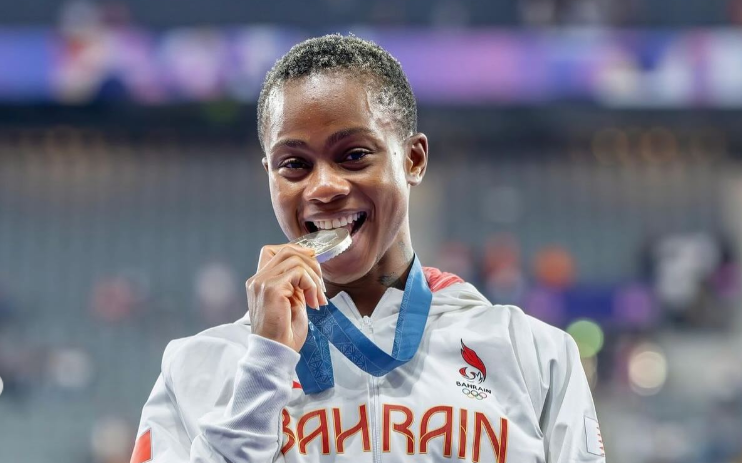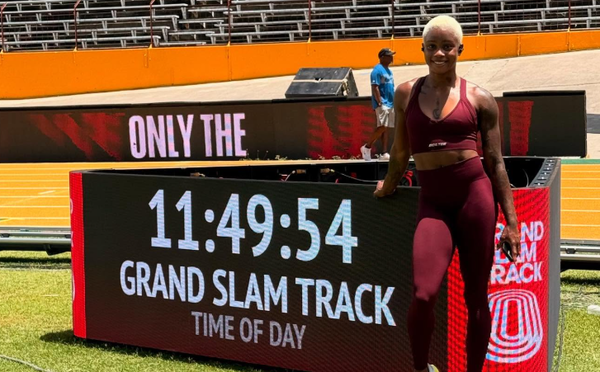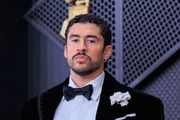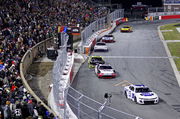

Salwa Eid Naser made a powerful return to the international track scene at the Grand Slam Track (GST), the brainchild of Olympic legend Michael Johnson. Competing in the 400m, she delivered a thrilling performance, clocking 49.33 seconds and finishing just 0.12 seconds behind Marileidy Paulino in the second phase of the competition. Naser started aggressively, covering the first 200m in under 28 seconds, setting the tone for a fierce contest.
Watch What’s Trending Now!
This wasn’t her only notable showing at GST. In the Kingston leg of the event, she went head-to-head with sprint star Gabby Thomas and blazed through the finish line in an impressive 48.67 seconds. These strong performances mark a remarkable comeback for the Bahraini athlete, whose road to redemption hasn’t been easy.
When her name appeared on the athletes’ list, it stirred controversy due to her previous doping suspension. One Reddit user bluntly questioned, “Naser… why are they signing drug cheats?” Yet Naser’s recent displays are a testament to her resilience. She’s out to prove that a single misstep doesn’t erase years of dedication and talent. But behind every great athlete is a strong support system. Let’s take a closer look at Salwa Eid Naser’s family—especially her father—and the role they’ve played in her journey.
ADVERTISEMENT
Who is the father of Salwa Eid Naser? Meet Ogunjiofor Agbapuluonwu
Jasmine Camacho-Quinn’s dad, James Quinn, was also a Bahrain track athlete—yet another peculiar thread in the interconnected web of global athletics. Salwa Eid Naser, whose name previously was Ebelechukwu Agbapuonwu, has won over the athletics community with her impressive speed and endurance. Behind her success is her father, engineer Ogunjiofor Agbapuluonwu, whose unwavering support played a pivotal role in her journey.
Agbapuluonwu once revealed, “I was a sprinter during my school days. So was Ebele’s mom. We met in 1985 at the stadium during school sports; she was representing her school and I was also representing my school, so Ebele is a natural-born athlete.” But her early experiences in Nigerian athletics were not easy. Her father remembered instances where she received poor accommodations and support during national competitions, resulting in physical and emotional stress. These difficulties made the family think about better prospects overseas.
ADVERTISEMENT

ADVERTISEMENT
When Salwa Eid Naser was just 14, she had to move to Bahrain, embracing a new chapter in her life. As she was previously known as Ebelechukwu Antoinette Agbapuonwu, she converted to Islam and then adopted her current name, Salwa Eid Naser. Her father stood by her decision, emphasizing that the move was essential for her athletic development and well-being. He criticized Nigerian sports officials for their lack of support, stating, “They should rather blame the country’s sports officials for the circumstances that led to her teaming up with Bahrain.”
Today, Salwa Eid Naser stands as a testament to determination and the impact of parental support. Her father’s advocacy and belief in her potential were instrumental in her rise to becoming a world-class athlete.
ADVERTISEMENT
Top Stories
Drake Maye Reveals Shoulder Injury Update as Patriots QB Announces News On Super Bowl Availability

PGA Tour Split Into Two as Scottie Scheffler Confirms Stance on Patrick Reed’s Return

NFL Sends Muted Warning to Bad Bunny Before Super Bowl Halftime Performance Amid ICE Controversy

Travis Kelce Makes Sporting Return as Teammate Gives Update on Chiefs TE’s Retirement

Tempers Boil Over as Punches Fly in Winthrop vs High Point WBB Game

“Complete Bullsh*t”: Cup Stars Run Out of Patience Mid-Race as NASCAR Clash Turns Into Demolition Derby

How his father shaped Salwa Eid Naser’s Olympic dream: A change of allegiance and more
“I’m the happiest man on earth following my daughter’s achievements,” Engineer Agbapuluown stated. He always defended her, even when critics targeted her for choosing Bahrain. Talking about her struggle and the kind of torture Nase faced, and even decided to quit racing. Ogunjiofor Agbapuluonwu said, “When she came back from Ilorin, she told me how they were made to sleep inside a bus and then early in the morning, around 4.00 am, they woke them up to take their bath in the open when it was still dark so that nobody would see their nakedness.”
This is how Naser chose Bahrain, and her father supported her, as he put it, “She was gradually recovering when the offer from Bahrain came. And I had no choice but to let her go. There was no way I could have stood in her way.” Salwa made a life-altering decision to switch allegiance and move to a Gulf country. Her father fully supported the move, believing it was essential for her growth and mental well-being.
ADVERTISEMENT
Salwa Eid Naser’s father’s belief wasn’t unfounded. By 2014, she made headlines by winning silver at the World Junior Championships in Eugene. A few years later, she would go on to claim gold at the 2019 World Championships in Doha with a blistering 48.14 seconds, becoming the third-fastest woman ever in the 400m. Salwa’s story is one of perseverance, but it’s also one of parental faith. Her father’s openness to allowing her to make a courageous leap, switch countries, and redefine her identity provided the ground for the Olympic dream she still pursues, and in the future, she has a bright future.
ADVERTISEMENT
ADVERTISEMENT
ADVERTISEMENT